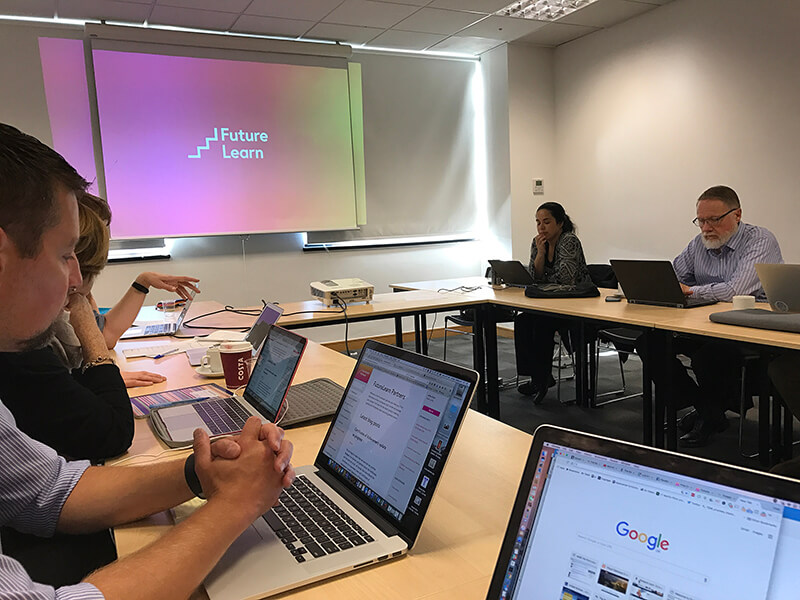February 27, 2017
Purdue partners with FutureLearn to provide faculty, students with new international online learning opportunities
 Clockwise from far right Maricel Lawrence, associate director for digital education; Michael Eddy, senior associate director for digital education; Jeff Chicki, instructional design specialist from Information Technology at Purdue (ITaP), and others participate in learning how to use the FutureLearn platform and develop courses. (Photo provided by Cody Connor, ITaP)
Download image
Clockwise from far right Maricel Lawrence, associate director for digital education; Michael Eddy, senior associate director for digital education; Jeff Chicki, instructional design specialist from Information Technology at Purdue (ITaP), and others participate in learning how to use the FutureLearn platform and develop courses. (Photo provided by Cody Connor, ITaP)
Download image
WEST LAFAYETTE, Ind. — Purdue University has entered a partnership that will take its content onto the global stage and will provide international learning opportunities for professors and students.
FutureLearn, based in the United Kingdom, is Europe’s largest massive open online course (MOOC) provider and was founded by The Open University, a distance-learning leader since 1969. Through this partnership, Purdue instructors will be able to reach a global audience with online learning content that further strengthens Purdue’s action plan for digital education.
“The FutureLearn platform will provide our faculty and staff the opportunity to reach broad audiences, large audiences, and different audiences with modular learning content in a cutting-edge social learning environment,” said Jon Harbor, Purdue’s associate vice provost for teaching and learning and director of digital education. “This is also part of a larger Purdue strategy to develop and take advantage of modern technology to further our land-grant mission.”
The MOOCs that are launching are free and open to anyone. The courses do not result in credits, but certifications can be obtained for a fee, typically about $60.
FutureLearn is one of the largest MOOC providers in the world but had not partnered with U.S. institutions until this year, agreeing to collaborate with Purdue, American University, Colorado State University, Pennsylvania State University, and the Darden School of Business at the University of Virginia.
“We are delighted to be making our first move into the U.S. market with a partner as progressive as Purdue,” said Simon Nelson, CEO of FutureLearn. “The many ways in which they are integrating MOOCs to extend their content, reach new students and introduce new perspectives to the campus should be an inspiration to universities around the world.”
Initially, four Purdue courses – psychology statistics, data science, and two in communications disciplines – will be offered as FutureLearn MOOCs that will launch in mid-April.
A majority of the FutureLearn courses will be 2-8 weeks long and might take 3-5 hours per week. All MOOCs can be completed on any device with internet capabilities, such as a smartphone, enabling a larger group of individuals to participate.
“There are a lot of conversations happening with instructors on campus, and I’m confident we’ll have a lot more MOOCs come out during the year,” said Maricel Lawrence, Purdue’s associate director for digital education.
MOOCs will make Purdue’s education available to a diverse global group. A faculty member might take content taught in a three-credit course and break it into multiple MOOCs, some of which could reach a K-12 audience, undergraduate students, employees of corporate partners, alumni, international partners, or independent learners. Also, potential students will be able to take a Purdue-offered MOOC as a way to gauge their interest in the university or even potential areas of study.
“Instead of using learning modules just once, they can be used in many different ways,” Harbor said. “Purdue will have an even wider portfolio of non-credit learning opportunities, and interested learners will be able to see and access the range of offerings Purdue has available.”
Some professors might also use MOOCs as a method for students in their classes to interact with a global audience, while people already in the workforce may complete a MOOC in communications and then decide to pursue an online master’s program. Information on scientific breakthroughs also can be relayed through MOOCs, allowing training and information to be taught to a wide audience in an expedient manner.
“It’s a canvas that faculty can paint in a wide variety of ways to meet lots of different audience needs,” Harbor said.
FutureLearn uses a pedagogy approach of social learning in the courses — meaning it creates an environment and encourages interaction and conversation among students and faculty — rather than a straight lecture period.
“There’s a very powerful learning theory behind the social learning approach, based on many years of experience and research, which forms the very core of the FutureLearn platform,” Harbor said.
Purdue’s partnership with edX, an online learning platform founded by MIT and Harvard, will continue.
Registration for the FutureLearn courses offered by Purdue can be completed online at https://www.futurelearn.com/partners/purdue. Questions on the FutureLearn partnership can be directed to Maricel Lawrence, Purdue’s associate director for digital education, at lawren36@purdue.edu.
Media contact: Brian Peloza, 765-496-9711, bpeloza@purdue.edu
Sources: Jon Harbor, jharbor@purdue.edu
Maricel Lawrence, lawren36@purdue.edu
Sarah Mulder: sarah.mulder@futurelearn.com, +44 7720401466

